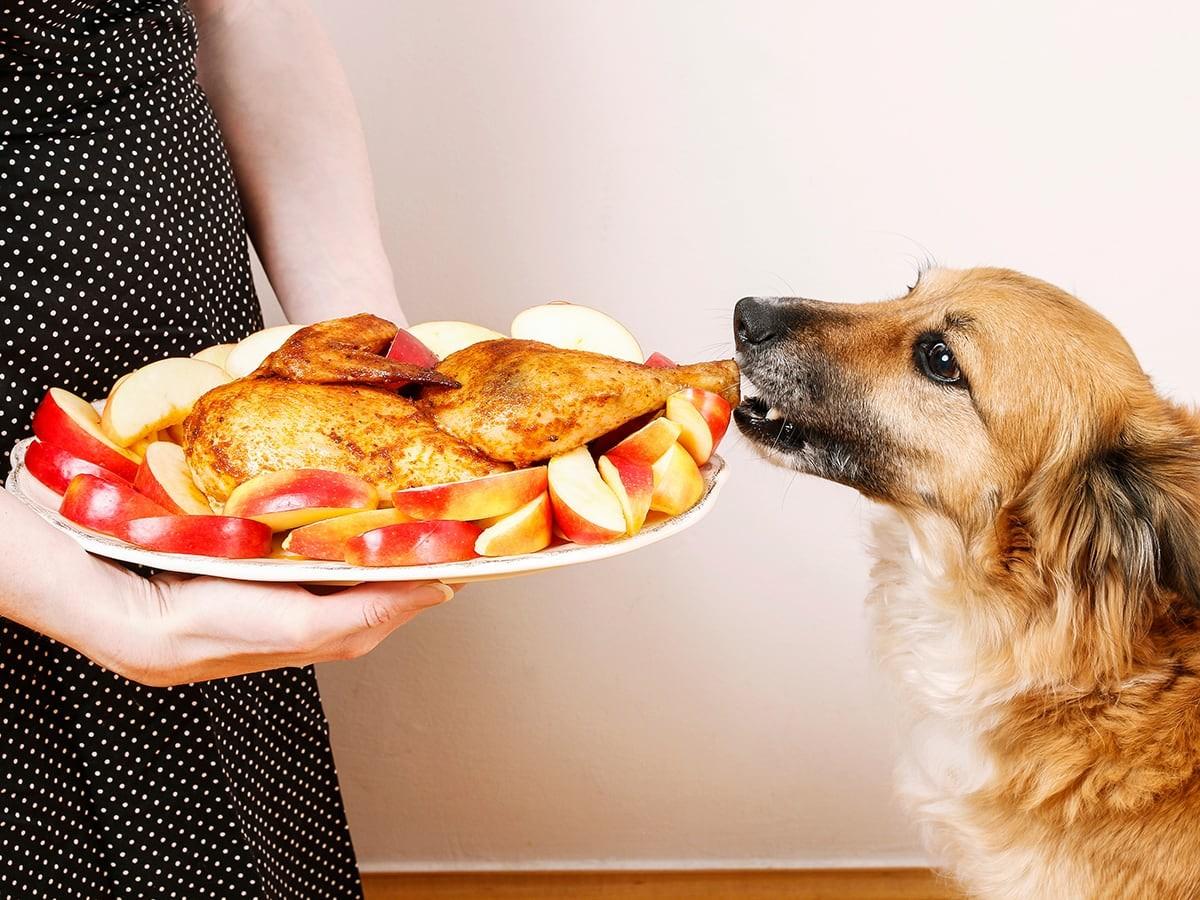Can My Dog Eat Turkey?
Let’s face it: Our dogs are extended members of the family. So, each Thanksgiving, you might find yourself wondering if you can set an extra plate of turkey meat for your furry family member to enjoy. Although you should avoid feeding your dog certain foods like: onions, mashed potatoes, gravy, or stuffing, there are some traditional foods that dogs can enjoy this holiday season.
First, always be sure to read nutrition labels before feeding any human foods to your dog. Be on the lookout for ingredients that may be toxic to dogs, additives, and anything your pup may be allergic to (you’d hate to rush to the vet during the holidays because of an allergic reaction!) It is always a good idea to check your dog insurance coverage for accidental toxin ingestion.
Remember that feeding your dog human food should be considered a treat, not a regular part of your dog’s diet.
Is Turkey Bad For Dogs?
There’s plenty your dog can enjoy at Thanksgiving dinner. For starters, pile on the vegetables, especially carrots and green beans. However, when it comes to the main event – the turkey – there are a few things you should know.
The good news is that plain, cooked turkey meat is safe for dogs to eat. In fact, you’ve likely fed turkey to them in a treat or in dog food once before.1 Many commercial dog foods use plain turkey as a healthy source of protein in their dog food formulas.
If you want to give your dog something to be grateful for, hold the skin, seasoning, and cooked turkey bones. While we humans can indulge in enjoying turkey with the skin on, the animal fat found in turkey skin can lead to obesity and pancreatitis in your pup.1
As for bones, your dog can safely consume them when raw, but remove any cooked bones from the turkey. Be sure to check for small bones – they can be sneaky.1
What Can Dogs Not Eat?
There are a few foods you should leave to the human relatives. According to Healthline, you should not feed your dog anything candied or containing chocolate, grapes, garlic, raisins, onion, raw yeast, macadamia nuts, lemons, or limes.
Double or triple-check any desserts your guests may bring (and your pup may try to sneak into). The theobromine and caffeine found in chocolate can wreak havoc in your dog’s digestive system, and the added sugar or sugar substitutes can also do some damage.2 Be sure to keep these foods far away from your fur baby’s reach!
What’s Thanksgiving without a little apple pie, though? Yes, on the apples, but hold the pie, ice cream, whipped cream, and any extra sweeteners–you really should only feed your dog raw or frozen fruits. If you want to keep things exciting, try a fruit salad medley: berries, bananas, and pineapple are all doggy-proof. A handful of plain popcorn with no salt or butter is also acceptable.
Happy Thanksgiving to you, your family, and the furry friends in your life!
What Your Dog Can Eat As Well
There’s no shame in wanting to give our dogs whatever food will make them happy. There just happens to be many other choices out there that are much healthier and more nutritious than pretzels. Here is a list of all the junk foods that your dog can eat.
Fruits
There are many fruits that dogs can eat which are packed with vitamins, dietary fibers, and antioxidants. The best are berries like strawberries, blueberries, cranberries, and raspberries. Dogs can eat bananas, oranges, apples, melons, mangos, and pineapples. Make sure fruits with pits, stems, cores, and seeds have been ridden from these items. Several of them are choking hazards and peach pits can be toxic. Grapes of any kind are poisonous to dogs, and even raisins shouldn’t be given to them.
Seafood
When seafood is free from shells, tails, bones, and legs, they are safe for a dog to eat. Dogs can have lobster, shrimp, salmon, crab, tuna, flounder, and a variety of other fish that is lower in mercury. Fish with too much mercury fed too often to our dogs can cause mercury poisoning. Uncooked or undercooked seafood can contain harmful pathogens and bacterium like salmonella which can make a dog extremely ill. Always ensure that seafood is thoroughly cooked before feeding it to your dog.
Beans
Beans can be great sources of dietary fibers and proteins which are necessary for a dog’s health. Dogs can have a wide variety of beans, including lima beans, pinto beans, black beans, garbanzo beans, soybeans, butter beans, kidney beans, navy beans, and even green beans. Beans should always be cooked thoroughly and fed to dogs in moderation to avoid tummy aches. Beans shouldn’t replace meat in a dog’s diet, since the meat they eat is a richer source of proteins.
Vegetables
As stated earlier, garlic and onions contain toxins that are bad for dogs, and even seasonings containing traces of these vegetables could cause problems. Avocado is another poisonous food because it contains a toxic chemical called persin. Other veggies are considered great sources of fiber and vitamins for dogs. Dogs can eat carrots, pumpkins, spinach, celery, brussels sprouts, broccoli, kale, and many other vegetables instead.
Nuts
Most nuts aren’t toxic to dogs, save for walnuts and macadamia nuts. Other nuts aren’t necessarily poisonous, but they can contain lots of salts, fats, and proteins that are difficult to digest. They also aren’t very practical because they can be choking hazards due to their shapes, sizes, and shells. Cashews, almonds, and pistachios are fine for dogs to eat moderately, especially when they are made into butter which is safer to eat in terms of obstruction.
Expert Insights from Spot
While sharing our favorite foods with our pets can be tempting, it's important to remember that not all human foods are safe for dogs. Spot's internal data shows that pet insurance claims for dietary indiscretions average $642*, highlighting the importance of caution and research before sharing snacks with your pet.

I've had the privilege of immersing myself in the realm of pet safety. As the owner of an energetic mini golden doodle, I know just how stressful being a pet owner can be. I am dedicated to ensuring our beloved pets enjoy a life brimming with good health.
*Jan 2019 to Aug 2024 Spot Pet Insurance Services, LLC claims data.
1. Arnold, Victoria Lynn. “Can Dogs Eat Turkey?” PetMD, 24 Sep. 2024, www.petmd.com/dog/nutrition/can-dogs-eat-turkey.
2. “Chocolate Toxicity: What Should I Do If My Dog Eats Chocolate?” Cornell University College of Veterinary Medicine, n.d.,, www.vet.cornell.edu/departments-centers-and-institutes/riney-canine-health-center/canine-health-information/chocolate-toxicity-what-should-i-do-if-my-dog-eats-chocolate.
The information presented in this article is for educational and informational purposes only and does not constitute or substitute for the advice of your veterinarian.












